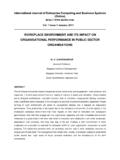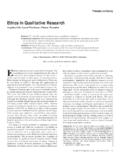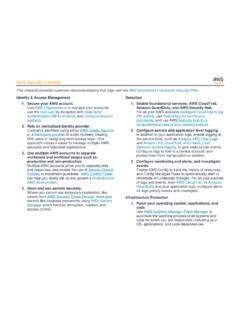Transcription of SECURITY AND ETHICAL ISSUES IN IT: AN …
1 International Journal of Enterprise CompuInternational Journal of Enterprise CompuInternational Journal of Enterprise CompuInternational Journal of Enterprise Computing and Business ting and Business ting and Business ting and Business Systems Systems Systems Systems ISSN (Online) : 2230 ISSN (Online) : 2230 ISSN (Online) : 2230 ISSN (Online) : 2230----8849884988498849 Vol. 1 issue 2 July 2011 SECURITY AND ETHICAL ISSUES IN IT: AN ORGANIZATION S PERSPECTIVE Devendra Kumar Tiwary Assistant Professor*, Department of Computer Application, Technical Education & Research Institute, Post-Graduate College, Ravindrapuri, Ghazipur, Uttar Pradesh (INDIA) _____ ABSTRACT Information Technology is changing the face of contemporary World. The IT has not only connected the World at one single platform but it is also helping in the integration of various traditional societies into modern societies.
2 Information systems raise new and often-perplexing SECURITY and ETHICAL problems. This is truer today than ever because of the challenges posed by the Internet and electronic commerce to the protection of privacy and intellectual property. Information technology has raised new possibilities for behavior for which laws and rules of acceptable conduct have not yet been developed. Information technology is introducing changes that create new SECURITY and ETHICAL ISSUES for societies to debate and resolve. Increasing computing power, storage, and networking capabilities including the Internet can expand the reach of individual and organizational actions and magnify their impacts. The ease and anonymity with which information can be communicated, copied, and manipulated in online environments are challenging traditional rules of right and wrong behavior.
3 ETHICAL ISSUES confront individuals who must choose a course of action, often in a situation in which two or more ETHICAL principles are in conflict. This paper argues that we must reconsider our approach to information SECURITY from the ground up if we are to deal effectively with the problem of information risk. Keywords: Challenges, Ethics, Information System, Information Technology, SECURITY . _____ International Journal of Enterprise CompuInternational Journal of Enterprise CompuInternational Journal of Enterprise CompuInternational Journal of Enterprise Computing and Business ting and Business ting and Business ting and Business Systems Systems Systems Systems ISSN (Online) : 2230 ISSN (Online) : 2230 ISSN (Online) : 2230 ISSN (Online) : 2230----8849884988498849 Vol. 1 issue 2 July 2011 Introduction SECURITY is a broad topic and covers a multitude of sins. In its simplest from, it is concerned with making sure that nosy people can not read, or worse yet, modify messages intended for other recipients.
4 It is concerned with people trying to access remote services that they are not authorized to use. Most SECURITY problems are intentionally caused by malicious people trying to gain some benefit or harm someone. Student have fun snooping on people s email, hacker hacks to test out someone s SECURITY system or steal information, businessman causes breach in SECURITY to discover a competitor s strategic marketing plan, an ex-employee leaks information to get revenge for being fired, a terrorist to steal germ warfare secrets . These all unauthorized access to information system causes serious SECURITY problems. Data SECURITY is a broad category of activities that covers all aspects of protecting the integrity of a computer or computer network. Under its most liberal interpretation, data SECURITY involves protecting a computer from external threats (from individuals outside the organization), internal threats (from individuals within the organization) and from threats to hardware as well as to software.
5 In this interpretation, disaster recovery can be considered a part of data SECURITY as information managers seek to protect data from natural disasters and manmade attacks. Organizations can improve their SECURITY by simply observing fundamental strategies such as using only licensed copies of software which are unlikely to have viruses installed on them and by limiting access to computers and files on those computers. Just as physical files have limited access points, so data files should also be limited to those individuals who have a business reason for viewing the files. Passwords and access codes provide rudimentary SECURITY at this level, and will prevent access by the merely curious. Information SECURITY is important in proportion to an organization s dependence on information technology. When an organization s information is exposed to risk, the use of information SECURITY technology, however, deals with only a small fraction of the problem of information risk.
6 In fact, the evidence increasingly suggests that information SECURITY technology does not reduce information risk very effectively. Ethics refers to the principles of right and wrong that individual, acting as free moral agents; use to make choices to guide their behaviors. Information systems raise new ETHICAL questions for both individuals and societies because they create opportunities for intense social change, and thus threaten existing distributions of power, money, rights, and obligations. Like other technologies, such as steam engines, electricity, the telephone, and the radio, information technology can be used to achieve social progress, but it can also be International Journal of Enterprise CompuInternational Journal of Enterprise CompuInternational Journal of Enterprise CompuInternational Journal of Enterprise Computing and Business ting and Business ting and Business ting and Business Systems Systems Systems Systems ISSN (Online) : 2230 ISSN (Online) : 2230 ISSN (Online) : 2230 ISSN (Online) : 2230----8849884988498849 Vol.
7 1 issue 2 July 2011 used to commit crimes and threaten cherished social values. The development of information technology will produce benefits for many and costs for others. Computer Ethics is a branch of practical philosophy which deals with how computing professionals should make decisions regarding professional and social conduct. Margaret Anne Pierce, a professor in the Department of Mathematics and Computers at Georgia Southern University has categorized the ETHICAL decisions related to computer technology and usage into 3 primary influences: The individual's own personal code. Any informal code of ETHICAL behavior that exists in the work place. Exposure to formal codes of ethics. Physicians, attorneys and other professionals whose job duties affect others lives usually receive, as part of their formal training, courses that address ETHICAL ISSUES common to their professions.
8 IT SECURITY personnel often have access to much confidential data and knowledge about individuals and companies networks and systems that give them a great deal of power. That power can be abused, either deliberately or inadvertently. But there are no standardized training requirements for hanging out your shingle as an IT SECURITY consultant or in-house SECURITY specialist. Associations and organizations for IT pros are beginning to address the ETHICAL side of the job, but again, there is no requirement for IT SECURITY personnel to belong to those organizations. The education and training of IT professionals, including SECURITY specialists, usually focuses on technical knowledge and skills. You learn how to perform tasks, but with little consideration of how those abilities can be misused. In fact, many IT professionals approach their work with a hacker s perspective: whatever you can do, you re entitled to do.
9 Information systems raise new and often-perplexing SECURITY an ETHICAL problems. This is truer today than ever because of the challenges posed by the Internet and electronic commerce to the protection of privacy and intellectual property. Other SECURITY and ETHICAL ISSUES raised by widespread use of information systems include establishing accountability for the consequences of information systems, setting standards to safeguard system quality that protect the safety of individuals and society, and preserving values and institutions considered essential to the quality of life in an information society. If organization running a large business, it will be confronting these ISSUES , and organization need to know how to deal with them. SECURITY Management: A closer look Information SECURITY can only be managed properly if, on a macro level, an internationally accepted reference framework (code of practice) is used, and if on a micro level, physical measurements can be made.
10 All this must be accompanied by an international information International Journal of Enterprise CompuInternational Journal of Enterprise CompuInternational Journal of Enterprise CompuInternational Journal of Enterprise Computing and Business ting and Business ting and Business ting and Business Systems Systems Systems Systems ISSN (Online) : 2230 ISSN (Online) : 2230 ISSN (Online) : 2230 ISSN (Online) : 2230----8849884988498849 Vol. 1 issue 2 July 2011 SECURITY certificate, and a comprehensive corporate information SECURITY culture. There are plenty of tools to enforce SECURITY in information system. Information being a vital resource for organization must be kept secure from unauthorized access. SECURITY tools minimize errors, fraud, and losses in the e-business systems that interconnect businesses with their customers, suppliers, and other stakeholders.




